Compelling stories from entertaining personalities attract radio listeners, but how do we push today’s new talents from online and on-stage towards on-air?
Don’t Kill The Radio Star, inspired by an often-quoted ‘guilty pleasure’ one hit wonder from The Buggles, was the premise of a personality radio panel at Lokalrundfunktage 2017 (German local radio days), hosted by freelance journalist and former PD Inge Seibel. How do we keep radio interesting for new talents from the millennial generation? After all, they’re often quite successful on their personal channels.
“Where are the 35-year old Arno Müllers?”
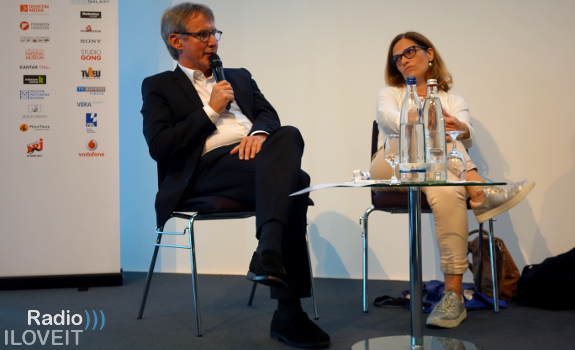
Talent coach Viktor Worms would like to see more investment in new talent (image: Thomas Giger)
Make your line-up great
Viktor Worms has a long track record, starting back in 1979 at RTL Luxembourg. In the years that followed, he switched both between public and commercial broadcasters, and between radio and TV. A complete generation of 40+ Germans knows him as host of a national music chart show that drew millions of viewers, but he spent most of his television years behind the scenes as executive producer of a popular show, and as entertainment director of the channel that was airing it. His radio accolades include co-launching and programming ANTENNE BAYERN (now Germany’s number 1 commercial station), as well as consulting and coaching stations and talents. He kicked off the session with a keynote.
A few years ago, he went back to radio, which he finds “less complicated” than TV thanks to “more normal people” and faster decision-making processes. In his opinion, what makes radio are the people on air. “Of course, the music needs to be right, and of course, presenters have to speak correct and breathe properly. As far as I’m concerned, they can also pay people’s bills, or pay them an additional salary.” But he does raise the question whether promotions like these have any emotional value: “I believe that’s 100% not the case.” Radio is different from streaming because it can have a team of “really extraordinary people who can simply ‘do’ it — people who you can even grant a certain level of freedom.”
Empower your top performers
For his own PD experience, he can testify to the fact that creative people are not easy. “It’s a brutal stress to be among them. They’re difficult; they’re complicated. It’s not always fun when they walk into your office with an ego that doesn’t fit through the door, and you, for two hours, try to discipline them somehow. Especially when other presenters, also good ones, are then walking in, asking: why is he allowed to do that while I’m not?” In situations like these, he used to simply justify a policy with neutral facts: “Those are his numbers; these are yours. When those are yours, you can do this, too.”
Working with Thomas Gottschalk, one of Germany’s high-profile TV personalities (who’s also done a lot of radio), taught him an important lesson: “Creativity never works top-down; it only works bottom to top”. He thinks that in this regard, a program director should merely be a facilitator: “You’re creating an environment for them to function in, and at some point you have a tough job telling them: here you went a bit over the top, or: this was not entirely great… and then listening how they are seeing it. But most of them, when they’re halfway intelligent, will understand it.”
Leverage your on-air stars
He points out that successful radio shows & stations can be immediately associated with a distinct personality. “104.6 RTL? Arno Müller! Who does pay people’s bills, and who once said: “you immediately see it working in the ratings, but I’m fed up with it as well”. ANTENNE BAYERN? Leikermoser. SWR3? Zeus & Wirbitzky. They’re influencers since 10; 20; 30 years. However, these guys are all 45 or 50, expect for Hans Blomberg. I’m a fan, too, but where are the 35-year-old Leikis; the 35-year-old Arno Müllers? Over the recent years, I haven’t met many that I consider to be cable of achieving the same — and that’s not because of them.” (He hints that today’s program directors could be a bit more brave.)
Worms feels like personalities are essential. “It’s an emotional connection that we need in radio; it’s the only future we have. That is my rock-solid belief. People are looking for contact with others that they can identify with.” He thinks there’s a reason why the number of Germans who are a member of some club is higher than it was over the past 40 years. Many people feel uncertain about how their (and their children’s) future world will look like, and are withdrawing themselves in local circles. “For local radio a huge opportunity; a huge one! When we’re finally starting to become a mirror of our community; when our presenters are living there, and are talking about it.”
“I see formats like a draft”
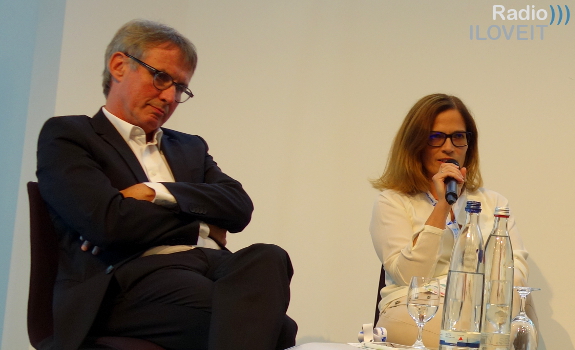
Carmen Schmalfeldt sometimes follows (and sometimes breaks) a format (image: Thomas Giger)
Keep your ears open
Some program directors might be afraid that once talents have successfully developed themselves, they will make their move to another station, a larger market, or a bigger medium. “Yes, that happens! So make sure you’ll get new talents all the time, keep on looking for them.” He thinks that there is talent enough out there; it’s just a question of how radio stations and content directors are treating them. “It is a pity when people in which we’ve invested are leaving. But it’s much worse when people in which we haven’t invested are staying…”
A personality who is extremely loyal to the station where he’s made his name is Robert Kratky. Then again, why should he leave? With a reach of 2.5 million, his morning show on Austrian public broadcaster’s Hitradio Ö3 is the most listened-to in the country. He’s with the station for 25 years; hosting breakfast for 13 of those years. “Format radio is not a bad word”, he says, as it has contributed to developing the worldwide radio industry. “For our listeners, it’s a beautiful orientation, and it helps many stations to prosper.” On the other hand, he’s experienced some contrast.
Match your brand values
“Ever since I’m in radio, I’ve had to stand up against someone who said: it doesn’t go like this.” His impression is that young talents usually don’t take much risk, while putting things aside is part of standing out and getting noticed. That goes for both life and radio.” A presenter who has been instructed to read liner cards could try new things. Over time, stations that are doing research may find that he’s successful with it, and therefore lets him carry on.
The current reality he hears, however, is that (especially commercial stations) often have nice-sounding voices on air, belonging to people who (on air) don’t have a lot of meaningful things to share. He compares it to the Alexa voice. “She has absolutely nothing to say.” Kratky notes that before launching personality-driven experiments, you want to realise what kind of station you’re with, and ask yourself if personality radio fits the station’s brand in the first place.
Follow your format basically
Carmen Schmalfeldt has been a morning team member of Germany’s most listened-to private station ANTENNE BAYERN, and is now hosting her own show at local station Radio Leverkusen. While she feels like her editor-in-chief “got himself a loaded gun” by hiring her, she doesn’t see format radio as evil either. “It depends what you’re doing with it. I see formats like a draft. Sometimes I follow it. Sometimes I consciously break it, which can be a useful style element.”
She believes that’s even possible for talents who have a limited speech time of say 2.5 minutes an hour. It comes down to being yourself, putting your personality into things, and therefore adding something of your own. For example, making content more personal: “You can read the weather forecast in a very dry and straight manner, or it’s ‘you’ who tells people what’s the weather right now, and that you are freezing as well — or whatever.”
“Do more with these people than teaching them how to do 3-element breaks”
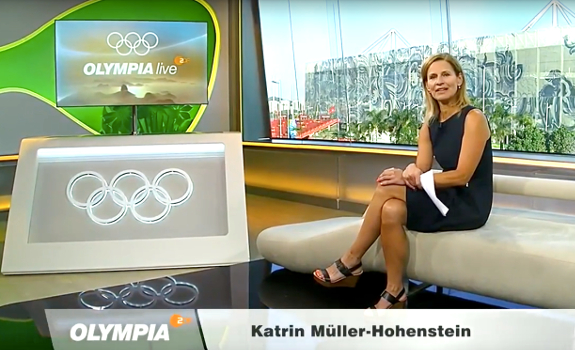
It may help to save personalities for radio, even after they get on TV (image: YouTube / Celebritys)
Use your personal judgement
Sina Peschke knows this topic from two sides; as on-air talent and program director. Her track records includes statewide commercial radio stations such as Antenne Thüringen, Landeswelle Thüringen and Radio SAW. “Of course, we can’t make radio without rules, like ‘news comes at the top of the hour’. You need a certain structure to feel comfortable. But don’t take it too seriously.” She agrees that rules are basically there to be broken when it serves a purpose, or “when you feel: that’s what I need to do know because you know it’s right”. In her experience, that process happens automatically for those who love what they do, and who know the rules.
Trust your gut feeling
Over the last decades, Viktor Worms has discovered many presenters, also during the launch of ANTENNE BAYERN in the early 1990s. On a mission to recruit those special talents, he and colleague Mike Haas first drew from their network of established radio personalities. The two ‘generals’ had almost signed a well-known female radio host from public radio, when Worms drove through Nürnberg one day, and heard a young lady presenting a traffic update on Radio Gong 97.1. “I quickly tried to find out who she was.” (It was Katrin Müller-Hohenstein, nowadays a popular sports presenter on German national TV.) She had something intangible that was appealing to the talent scouts.
Develop your leadership psychology
“Mike and I, in many ways, had different beliefs about what radio personalities can do within the format, and when they’re allowed to break it. I played him a short take — I believe it was nothing more than a weather forecast — and we immediately agreed. There are people whose voice and personality can fill a room, in a way where something appeals to you, and you don’t even know what.” From his experience in programming, he thinks that every PD should learn to deal with talents, who are often as difficult as they are creative. “I feel like they’re still out there today, but not every station makes an effort to do more with these people than teaching them how to do 3-element breaks and rattle off traffic updates. That’s a pity, and the death of radio.”
“He wears his heart on his sleeve, and he does everything wrong you can do wrong, according to our rules”
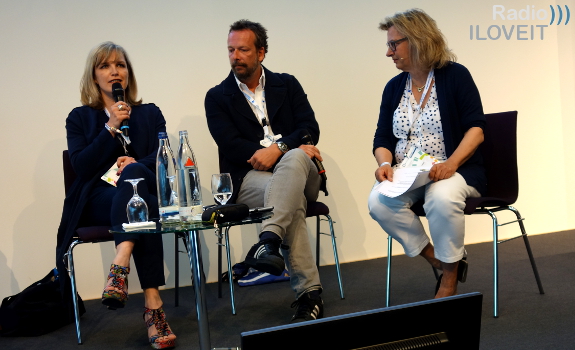
Sina Peschke loves listening to a talented young ‘rough diamond’ colleague (image: Thomas Giger)
Make your medium interesting
When clients ask him to find talents, Worms doesn’t immediately turn to radio anymore. He first looks around on Facebook, YouTube and live shows, like stand-up comedy and poetry slam. However, that these performers are more into their own thing. He recently suggested a well-known stage comedian to host a radio show on a significant station. “He replied: ‘you know, I never thought about that. Radio? I don’t know. Ah, maybe for my stage shows — I could do a column.’ They currently don’t see their future in radio, and: they have become independent channels of their own. We need to urgently do something about this, otherwise we’re making ourselves obsolete. I believe in radio, and I love radio, but currently, we are walking into a dead-end street, and it is called: time spent listening.”
Compensate your talents well
Sina Peschke adds that when we want to keep radio attractive for great new talents, a decent financial reward makes sense as well. “I’ve heard what people hosting a daily 5-hour morning show on a local station in North Rhine-Westphalia are making. One may say: money doesn’t play a role; you first have to do things with passion. But in the end, it does play a role.” She feels lucky to have gotten into radio when the first commercial stations kicked off in eastern Germany, after the Berlin Wall had come down in the early 1990s, in a state of practical lawlessness. “We could do whatever we wanted, because there was no one controlling it. Some things that happened on the radio wouldn’t happen today.”
Grant your personalities freedom
Peschke often listens to a neighbour station in mid-Germany, which carries a presenter with obvious talent. “This young guy could be my son; I love listening to him. He wears his heart on his sleeve, and he does everything wrong you can do wrong, according to our rules. And he’s cut off after 30 seconds. There seems to be a rule that he cannot talk beyond 30 seconds; a really ‘castrated’ presenter. I’m saying to myself: why isn’t he allowed to talk longer; why don’t they provide at least once an hour two minutes where he can go loose, and do whatever he wants? He’s like a locked shotgun, which is not caused by himself, but from above.”
“You have to be able to handle critics”

Carmen Schmalfeldt knows that polarising personalities, such as 104.6 RTL’s Hans Blomberg who’s met a lot of external resistance during his career, need to be resilient (image: 104.6 RTL)
Keep your head calm
Carmen Schmalfeldt agrees with Viktor Worms that there are great personalities out there. “Looking at the interns at Radio Leverkusen alone, I’m often thinking: wow… incredible!” But she speaks of a two-sided sword. Many bosses are afraid to cope with a personality, and many personalities are reluctant to be one. Someone who she finds very talented, recently said to her: “I don’t want to be on air, because there you are in the spotlight; getting lots of feedback.” She feels like not many personalities want to deal with public responses to polarising statements that they may make now and then. “You have to be able to handle critics.” She knows from personal experience that listener emails and social media posts are not always friendly. “You have to want to cope with that.”
Has Hitradio Ö3 presenter Robert Kratky ever been close to getting fired? Read it in part 2.
Header image: BLM / Lokalrundfunktage

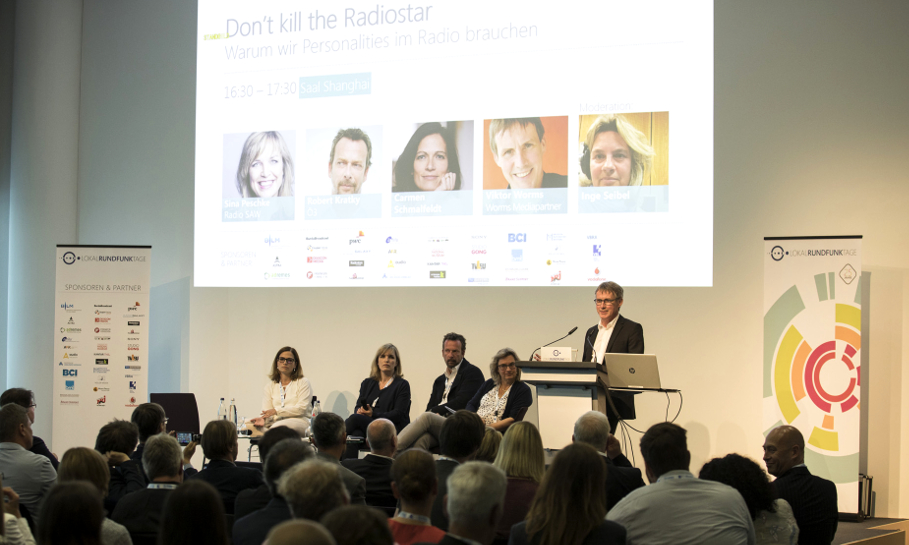




Add Your Comment